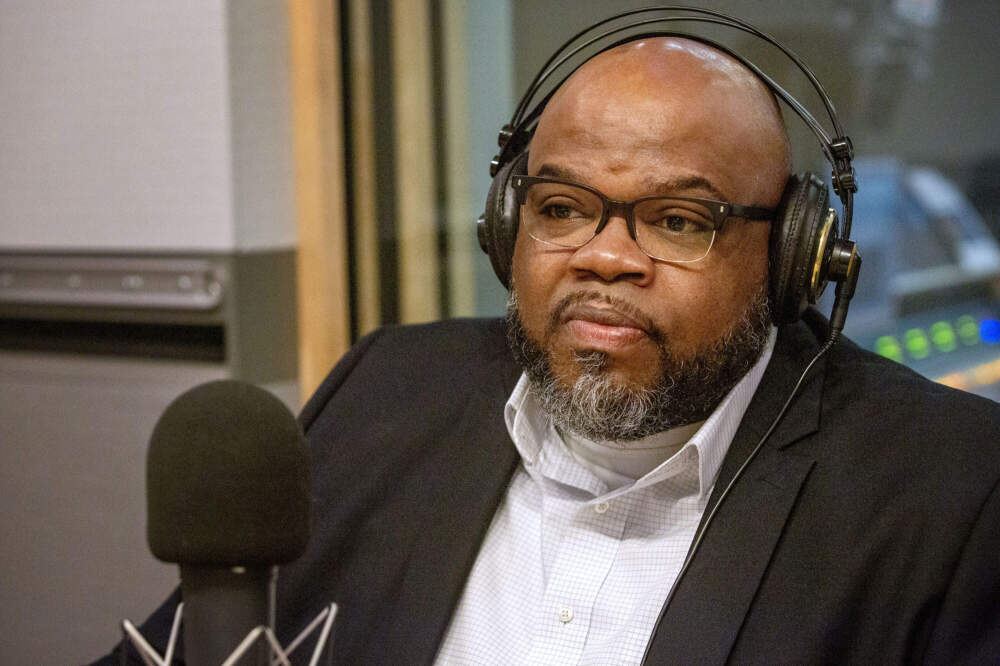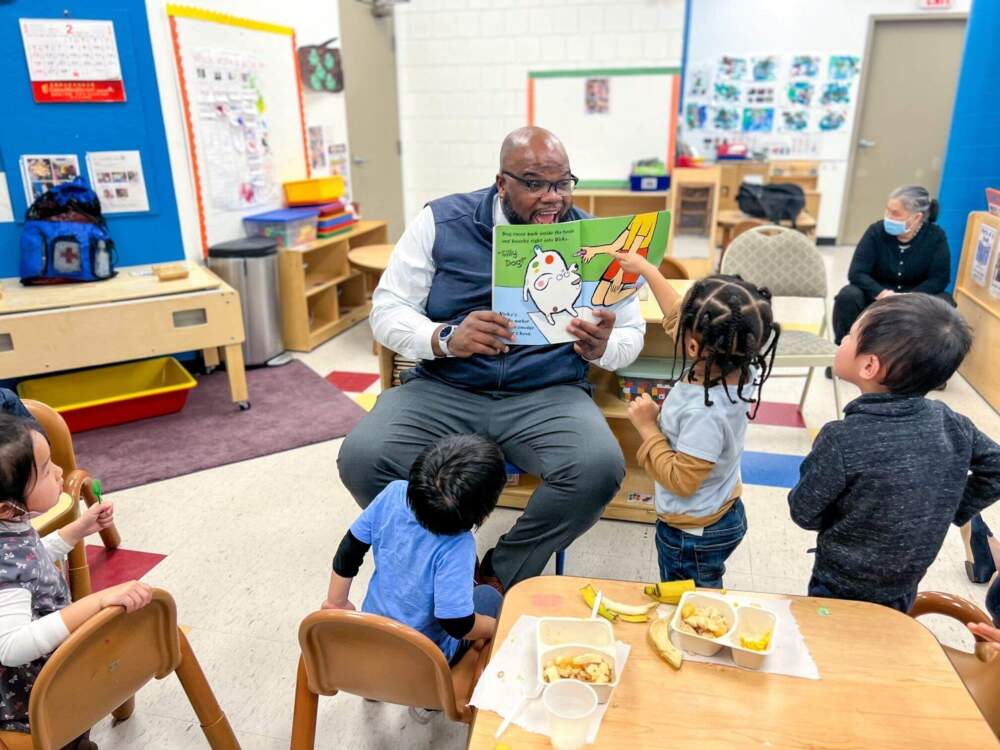Advertisement
A conversation with Massachusetts Education Secretary Patrick Tutwiler

2023 was the beginning of a new era of education leadership in Massachusetts. Patrick Tutwiler stepped into the role of Massachusetts' Secretary of Education in January, replacing Jim Peyser, who held the role since 2015. But this wasn’t an ordinary changing of the guard. Tutwiler is the first Black person to serve as Massachusetts' top education officer. He brought with him more than two decades of experience working in and leading state public schools, including serving as superintendent of Lynn Public Schools. As 2023 winds down, WBUR’s education team sat down with Tutwiler to reflect on his first year on the job and what he hopes to accomplish in 2024.
The conversation has been edited for length.
During one of your first public speeches as Massachusetts' education secretary in January, you said your office would lead from a framework of "stabilize, heal and transform." Can you describe what you meant by that and how the state has met those goals?
We intentionally use the words "stabilize" and "heal" to signal that we're still in a recovery period from the pandemic. There are significant challenges around mental health and staffing.
I think the past 10 months have been significant in those spaces and really on all three levels: early education and care, K-12, and higher education. The steps that we've taken in early education to stabilize involved meeting the needs of providers and families with our Commonwealth Cares for Children grants. In K-12, we've done a lot around [anxiety and depression] screeners. We've provided universal meals, made that permanent. So we were really thinking about a hierarchy of need: what are the things that we need to do to support students, families with really sort of getting back [on track].
What has been done to "transform" education this year?
In the K-12 Space, we're starting to embrace this idea of reimagining high school. Big pieces of that involve expanding innovation, career pathways, early college programming. There was a $46 million investment in the current fiscal year to expand those programs. So we're absolutely thinking about transformation right now.
Chronic absenteeism has been a lingering problem in Massachusetts since the COVID-19 pandemic. According to state data, close to 200,000 kids are considered "chronically absent," which means they've missed more than 10% of school days in a year. How are you tackling that problem?
I'd say it's a complicated issue, but we have some pretty compelling thoughts around how to address it. I mean, you're right, this is a significant issue that we're experiencing. Prior to the pandemic, chronic absenteeism rates statewide were in the 9% to 13% range. It's 22% right now. It was 27% last year.
So we are moving in the right direction, but this is an important thing to pay attention to. As I often say, absenteeism is really a manifestation of a need being unmet. We need to think carefully about questions like, is there a mental health challenge the student is experiencing? Do they have stable housing and enough food? Those are the kinds of things that we're having deep conversations about. In our first fiscal year, we really were thoughtful about investing in mental health strategies and universal [mental health] screeners. I think we're going to see improvements over the coming years. But it is a big issue and we're paying close attention to it.

State education commissioner Jeff Riley recently proposed assigning greater weight to attendance as a state accountability measure. He got some pushback from board members. How do you feel about it?
That's a conversation that's ongoing at the board. In the last meeting, there was a clear description of what that process will look like. It needs to first be approved by the board to go forward and then go through a public comment period. If you think about it, we're not going to see the kinds of academic recovery that we would like to see in the state of Massachusetts unless students are attending [school] regularly.
The state has seen a large number of recently arrived children from other countries enter the school system. How has the state been supporting districts who serve new arrivals?
In a number of ways. But first, I want to articulate a core value around this challenge. We believe deeply that it shouldn't matter where a student comes from, whether they were born here or got here yesterday or what their housing status is. Every student deserves a high-quality education. So we're starting from that core value and then moving to action.
In particular, school districts receive $104 per [every] student who comes from a shelter environment to support some of the financial impact. The Department of Elementary and Secondary Education has been incredible in terms of offering supports for staff who might not have deep experience working with students for whom English is not their first language — [such as] giving them the tools and the skills to meet their needs in the classrooms.
We've distributed a lot of guidance around how to service the needs of students who are trauma-impacted. Transportation can also be a challenge getting students from shelter to school — there's also been financial support for districts in that way. And with the most recent supplemental budget, we were able to continue those supports for school districts.
Advertisement
The Massachusetts Teachers Association said it gained enough signatures for a ballot initiative aimed at removing the MCAS from being a graduation requirement. How do you feel about that effort?
I believe deeply that every student is capable of passing the MCAS on the 10th-grade level. So, you know, we need to remove this idea that somehow students aren't able to overcome this particular challenge. This is a conversation that we've engaged in robustly with MTA, with stakeholders, and we're going to continue to decide what the best stance on this is. But I think it first starts by saying or articulating clearly the core value that we believe every student is capable of being successful.
The U.S. Supreme Court ruled against Harvard and UNC this summer for their use of race conscious admissions. This dealt a really big blow to affirmative action in higher education. How has your administration been thinking about this when it comes to access to higher education in Massachusetts?
We were sort of reading the tea leaves before that particular decision dropped in late June. We established an advisory council to give counsel to the governor on what policy or resource shifts should be made down the line.
We're one of the first states, thankfully, who have released guidance to both colleges and universities as well as high schools around steps (they) can take to ensure that there's representation in higher education.
We have tried to remove financial barriers to higher education in particular. Massachusetts just recently expanded its MassGrant Plus scholarship program, which allows all Pell-eligible students to attend higher education in Massachusetts, tuition-free, fee-free and (without paying for) books.
We're also trying to ensure that there's targeted outreach to communities where there is a high concentrations of underrepresented populations. We've started to do that already with our Massachusetts Education Financing Authority. That's a resource rich online program that's available in multiple languages. The program is evidence-based to help families navigate the process of getting into college.
This article was originally published on December 11, 2023.
This segment aired on December 11, 2023.

